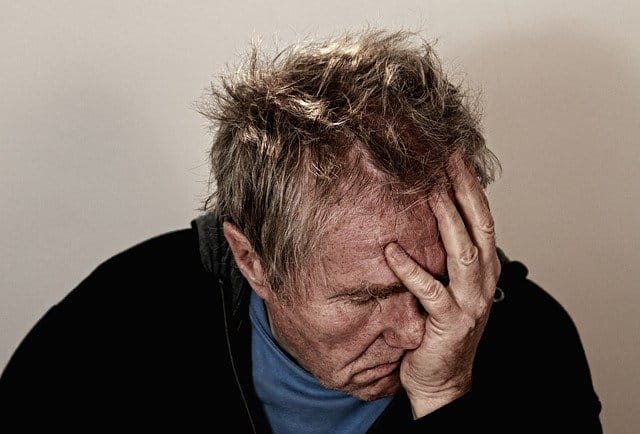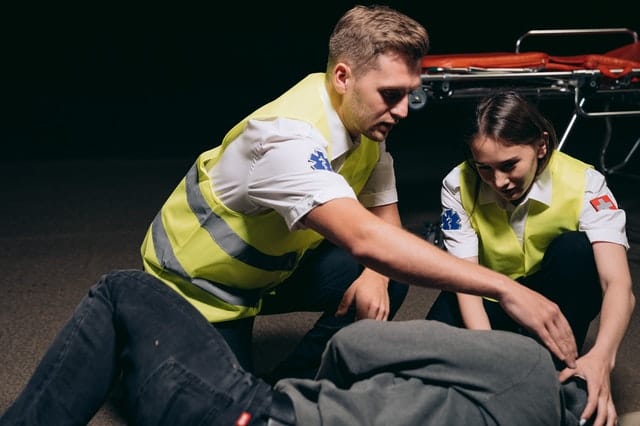Alcohol addiction, also referred to as Alcohol Use Disorder (AUD), is a form of substance addiction.
When someone is suffering from an alcohol addiction, they are physically or psychologically – or in some cases, both – addicted to alcohol.
This means that their mind and body undergo cravings which make it difficult to function, and they feel compelled to consume alcohol again in order to feel “normal” and to perform basic daily tasks.
The factors which lead to alcohol addiction will vary from one subject to another.
There are many different variables to consider when assessing why someone is dependent or addicted to alcohol:

Alcohol Withdrawal Syndrome (AWS) is what occurs when someone who has been consuming alcohol suddenly abstains.
When this happens, their body will experience discomforting alcohol withdrawal symptoms.
A hangover is an example of short-term alcohol withdrawal.
After a night of excessive drinking, subjects will suffer from short-term alcohol withdrawal symptoms such as headaches, nausea, vomiting, fatigue and more.
However, long-term and excessive alcohol consumption will develop into an addiction, and alcohol withdrawals can last as long as weeks for someone who is dependent on the substance.

Alcohol addiction puts the person in a maladaptive state, and once they abstain from alcohol, they struggle to function optimally despite the toxic and unhealthy substance withdrawing from their body.
Essentially, the subject has become used to having these substances in their body in order to function, and abstaining from this substance will lead to changes in the body and brain.
The brain disease model of addiction [2] is a neuroscientific model which helps us understand how an addiction forms.
In our brains are reward pathways.
These pathways are dopaminergic, meaning that they are responsible for releasing dopamine – the “feel good” hormone – when we complete activities such as eating, exercising, sexual intercourse and so on.
Alcohol triggers these pathways in our brains into releasing dopamine, which is why we experience pleasure when drinking.
However, they also overstimulate these pathways.
If we expose ourselves to alcohol too frequently and too heavily, these pathways become reliant on alcohol in order to experience pleasure.
As a result of this overstimulation, these pathways become dependent on the presence of alcohol, and it becomes hard to experience pleasure or satisfaction from other activities which help us naturally release dopamine.
When we abstain from alcohol, the body and mind experience cravings in the form of withdrawal symptoms such as headaches, anxiety, depression, vomiting and more.

When someone who is psychologically and physically dependent on alcohol suddenly stops drinking, they will experience a range of discomforting symptoms.
These symptoms include but are not limited to:

The scale, severity and length of time in which alcohol withdrawal manifests and ceases will vary from one person to the next according to many factors.
Some of these factors include but are not limited to:
These variables will also affect how and when alcohol withdrawal symptoms present themselves.
Not all subjects will experience these symptoms.
However, according to the Introduction to Alcohol Withdrawal journal, [8] one could expect the alcohol withdrawal symptom timeline to look like:
Subjects who are suffering from alcohol addiction will typically experience their first symptoms of alcohol withdrawal around the 24 hour mark.
Those who are suffering from mild to moderate forms of alcohol addiction and withdrawal will suffer from symptoms such as intense cravings, headaches, irritability, insomnia, paranoia, sweating and so on.
These symptoms can manifest as soon as 6-12 hours after the last period of consumption.
Hallucinations typically manifest from around the 24 to 48-hour mark, and subjects will see and hear things that are not actually there, leaving them in a state of confusion.
Those who are suffering from heavy forms of alcohol addiction may suffer from seizures soon after they abstain from alcohol.
Multiple seizures are not uncommon, and a second seizure sometimes follows around 6 hours after the first seizure.
These seizures have the potential to kill subjects who are suffering from extreme forms of alcohol dependence.

For subjects who are suffering from a mild form of addiction, their symptoms will peak around the 48-hour mark, and will begin to decrease at the 72 – 96 hour mark.
In severe cases, symptoms of Delirium Tremens typically manifest around the 48 – 72 hour mark but can form earlier.
This will lead to high blood pressure, fever, hallucinations and more.
Delirium Tremens have the potential to cause complications that lead to death.
If the person is suffering from a mild form of alcohol addiction, they may notice that their symptoms stop intensifying or actually start to decrease in severity.
For those suffering from moderate forms of alcohol addiction, they will typically experience withdrawal symptoms at their worst at the 72-hour mark.

Subjects suffering from mild and even moderate forms of addiction may see that their alcohol withdrawal symptoms have begun to decrease at this point.
However, in the more severe cases of addiction, alcohol withdrawal symptoms can persist for as long as weeks or even months after the last period of alcohol consumption.
This is called Post-Acute Withdrawal Syndrome. [9]
While the earlier forms of alcohol withdrawal symptoms can come and go within moments, long-term symptoms can manifest but less frequently so.
Some of the most common factors of Post-Acute Withdrawal Syndrome include but aren’t limited to:
Studies also show that 5% of alcohol withdrawal seizures may occur 5 to 20 days after the last period of alcohol consumption.

There are different methods and approaches when it comes to overcoming alcohol addiction and withdrawal.
Different methods will be applied depending on the patient, the specific health and rehabilitation provider, the severity of addiction, and so on.
Here are some of the most common ways of overcoming alcohol addiction and its withdrawal symptoms.

The safest and most effective way of managing and overcoming alcohol withdrawal symptoms is to undergo a medicated assisted detox at a residential drug and alcohol rehab.
Here, patients will spend around 7 to 10 days allowing alcohol to withdraw from their body while they undergo medication prescribed from an addiction physician.
What makes this the most safe and effective option is that patients will stay at a medically supported facility.
This safe and comfortable environment will be monitored by health practitioners 24 hours a day, who are experienced and ready to treat the patient in the event of any illness.
Patients will also be prescribed medication, which will help minimise symptoms.
Common forms of medication prescribed during a medical detox at rehab include:

Suddenly abstaining from alcohol is a method which many people take upon themselves to overcome alcohol or drug addiction.
While, in theory, it is simple, it can cause a range of complications and make it difficult for the subject to sustain, and it often leads to a relapse.
Only those who are suffering from a mild form of addiction should consider quitting “cold turkey”.
This is because their symptoms are less likely to be severe, increasing their chances of successful recovery.
The term cold turkey comes from the goosebumps that people sometimes experience once they abstain from addictive substances.
Those who are suffering from moderate to severe forms of alcohol addiction should seek assistance from a rehab during the withdrawal process.
This is because abstaining suddenly can cause severe health complications which can even lead to death for those who are addicted to alcohol in the extreme sense.
For example, Delirium Tremens has an anticipated 37% mortality rate [11] without proper treatment.

Tapering and harm reduction are sometimes encouraged for patients who are suffering from moderate to severe withdrawal symptoms.
Whilst undergoing a medicated detox at a rehab facility, patients are encouraged to taper or wean their alcohol consumption gradually.
This will minimise withdrawal symptoms as the body is adjusting to lesser quantities of alcohol in the body.
This allows the body and brain to become accustomed to having less and less alcohol in the body without suffering from withdrawal symptoms, and eventually they will be able to abstain safely.

For optimal results, subjects should consider entering a drug and alcohol rehab in order to treat their addiction.
At a drug and alcohol rehab, patients will undergo personalised treatment programmes in order to optimise their recovery.
This personalised treatment programme will incorporate various stages which have many unique benefits.
These stages include:

If you are worried that you or a loved one may be suffering from alcohol dependence or an addiction, please reach out today.
It is never too early to reach out for support, and the sooner you do, the easier recovery will be and the less detrimental the effects of addiction will be.
Contact us by dialling the number 0800 140 4690. Once you contact us, you’ll be greeted by a friendly and trained member of our team.
This person will be here to answer any questions or concerns that you have about addiction and recovery, and they will be able to help you get started with the admissions process, but only when you are ready to do so.
This initial assessment is swift, free of charge, and can be completed from the comfort of your own home.
[1] https://www.ncbi.nlm.nih.gov/pmc/articles/PMC2715956/
[2] https://www.hazeldenbettyford.org/research-studies/addiction-research/brain-disease-model
[3] https://www.ncbi.nlm.nih.gov/pmc/articles/PMC6761824/
[4] https://emedicine.medscape.com/article/166032-overview?form=fpf
[5] https://www.ncbi.nlm.nih.gov/pmc/articles/PMC6943828/
[6] https://pubmed.ncbi.nlm.nih.gov/8654316
[7] https://www.ncbi.nlm.nih.gov/pmc/articles/PMC6761825/
[8] https://www.ncbi.nlm.nih.gov/pmc/articles/PMC6761824/
[9] https://www.hazeldenbettyford.org/articles/post-acute-withdrawal-syndrome